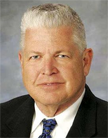Chino City Councilman Glenn Duncan has retired less than a year into his current elected four-year term.
A council member for 24 years and a Chino resident for 34 years, Duncan has been on the council since 1992. Though he never represented himself as an out-and-out opponent of Chino’s preservation as a rural agricultural community in the midst of increasingly urbanized Southern California, Duncan’s tenure corresponded with the demise of the Chino Agricultural Preserve. At the time of his ascension to the city council, the overwhelming presence of flies in the community had become an issue. Among his first assignments as a councilman was to chair a committee chartered to eradicate Chino’s fly infestation. Throughout his time on the council his was a voice in favor of greater rather than less density in residential subdivisions permitted into the city. Over the last year, he was a member of the council majority that has overruled the objections of citizens in two of the city’s remaining rural zones who took stands against the encroachment into their neighborhoods of more intensified development than has been historically allowed under the city’s zoning codes and general plan.
A grocer who later was the proprietor of GTS Financial Services, Duncan has shown himself to be a creature of both government and the development community. In addition to being on the city council, since 2012 Duncan has held an appointed position conferred on him by the San Bernardino County Board of Supervisors on the board of the San Bernardino County Employees Retirement Association, in which capacity he oversees the more than $6 billion pension fund for the county government’s retired employees.
Within the last year, Duncan encountered controversy along with the rest of the city council when the council imposed on the city a ward system which conferred on the incumbent council members political advantages going into future elections. After the city was threatened with a lawsuit over what was termed polarized voting that was claimed to be prejudicial to minorities, the council elected to move the city to an electoral ward system rather than the at-large election process the city previously used. Several ward plans were considered but the one that was eventually chosen created four wards, in each of which one, and only one, of the city’s four incumbent council members dwelt, thus ensuring that the incumbents would not need to run against one another and that each would be able to take full advantage of his or her individual incumbency against any challengers.
Somewhat ironically, Duncan will be unable to use that advantage he and his council colleagues provided him. His decision to retire was in some fashion imposed on him when he learned late last year that he is in the primary stage of Parkinson’s disease. This precipitated his plan to move with his wife to Palm Desert, a hot and dry environment that might serve to slow the progression of the disorder.
Duncan served as a trustee and board president on the West Valley Mosquito and Vector Control District, and was a member of the boards overseeing the Southern California Association of Governments, a regional planning agency known by its acronym SCAG; the Ontario Airport Noise Abatement Strategy Committee; and the Water Facilities Authority. He was declared by the Chino Champion, Chino’s local newspaper, the Outstanding Citizen for 2014. In 2010, Duncan and his wife, Cindy, were recognized by the California Park and Recreation Society as Laymen of the Year for their more than 20 years of community involvement promoting community recreational activities.
SBCSentinel
News of note from around the largest county in the lower 48 states.

